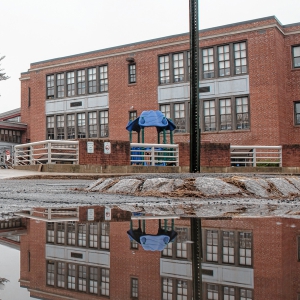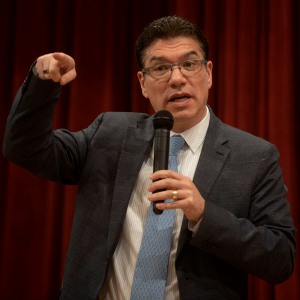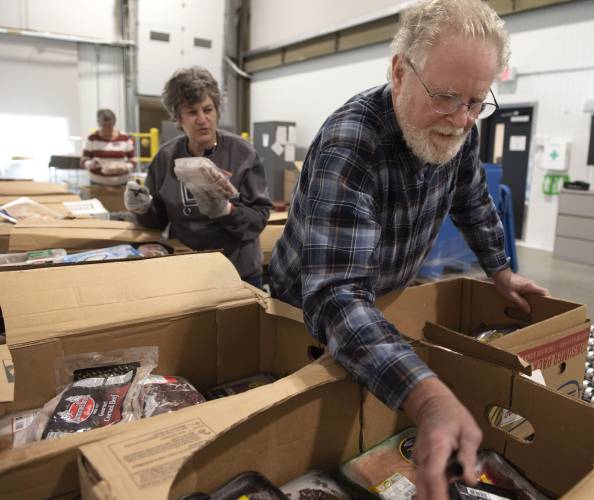USDA yanks $3.4M in aid to state food banks
|
Published: 03-28-2025 4:39 PM
Modified: 03-28-2025 6:40 PM |
NORTHAMPTON — A decision by the U.S. Department of Agriculture to terminate a $3.4 million allocation to Massachusetts for purchase of 121,830 cases of food items, including eggs, chicken, milk, fruit, pasta, beans and salmon for food banks across the state is being criticized by representatives of food security organizations and the Healey-Driscoll administration.
“It’s hard to see how these cuts align with Donald Trump’s ‘Make America Healthy Again’ directive,” said Lt. Gov. Kim Driscoll.
In western Mass., the “USDA cancellation of food orders just removed the equivalent of 185,000 meals of nutritious assorted frozen meats, dairy, fresh fruit and dried beans from people’s tables,” Andrew Morehouse, executive director of the Food Bank of Western Massachusetts in Chicopee, said in a statement. “It’s shameful to take food away from seniors, children and working families who can’t make ends meet.”
Other food banks around the state are also facing steep cuts in support.
On Thursday, the USDA’s Northeast Regional Office informed the Department of Elementary and Secondary Education that The Emergency Food Assistance Program Commodity Credit Corp. bonus food order was being canceled. The USDA had established the Commodity Credit Corp. bonus food order to assist emergency food organizations as they continue to confront supply chain challenges and elevated food costs.
In the four counties of western Massachusetts served by the western Mass. food bank, the number of meals lost is calculated based on the $439,606 it would have received from TEFAP, Morehouse said. The USDA support typically provides about 21% of the food bank’s inventory annually and 3 million meals that go to local food pantries, meal sites and senior centers, including many in Hampshire and Franklin counties and Holyoke.
Morehouse had previously expressed concerns about losing portions of this funding, even before the state received the cancellation notice.
“Cuts to this program would exacerbate our ability to get enough healthy food to people when and where they need it,” Morehouse said.
Article continues after...
Yesterday's Most Read Articles
 Northampton schools probe staff response to student’s unfulfilled IEP
Northampton schools probe staff response to student’s unfulfilled IEP
 Nearly all of South Hadley High’s student body holds ‘walkout to walk-in’ rally to oppose cuts, call for funding reform
Nearly all of South Hadley High’s student body holds ‘walkout to walk-in’ rally to oppose cuts, call for funding reform
 UMass Chancellor Reyes outlines changes amid financial uncertainty under Trump administration
UMass Chancellor Reyes outlines changes amid financial uncertainty under Trump administration
 Northampton Housing Authority boss placed on leave
Northampton Housing Authority boss placed on leave
 Hopeful buyers emerge for Magic Wings butterfly conservatory in South Deerfield
Hopeful buyers emerge for Magic Wings butterfly conservatory in South Deerfield
 ‘For the love of music’: Florence Community Band set to hold first-ever multigenerational concert
‘For the love of music’: Florence Community Band set to hold first-ever multigenerational concert
In addition to the TEFAP cut, the state education department received notice from the USDA about cancellation of fiscal year 2025 Patrick Leahy Farm to School State Agency Grant Program, which would have provided $384,446.
No reasons have been provided for either cutback, according to state officials.
In a statement, Healey took President Donald Trump to task for taking away food from children and families.
“Massachusetts food banks do incredible work to make sure local families have access to nutritious food, which promotes food security, reduces medical costs and supports the economy,” Healey said. “Additionally, the TEFAP program connects students with local, healthy food while also supporting farmers and local business.”
Previously, there had been a $500 million reduction in the Local Food Purchase Assistance Cooperative Agreement Program that helps food banks purchase local, healthy food, and more than $12 million was stripped from the Local Food for Schools grant funding that would have provided local, healthy food to child care programs and schools in Massachusetts.
Secretary of Education Patrick Tutwiler said he is troubled by the Trump administration not focusing support on the most vulnerable.
“Farm-to-school grants have been important funding sources to connect students with nutritious, local food and help set them on a path toward lifelong health,” Tutwiler said. “These cuts harm our students, schools, farmers and local businesses and economy. They make no sense and are a continued assault on the future of our children.”
“The cancellation of the Patrick Leahy Farm to School grant program and TEFAP, coupled with the termination of the Northeast Food for Schools and Local Food Purchase Assistance Cooperative Agreement programs, has a cascading impact across the local food system,” state Agricultural Resources Commissioner Ashley Randle said in a statement. “Family farms, students, and food insecure individuals are negatively impacted by these funding reductions and the opportunity for students to access nutritious, locally grown food becomes more difficult.”
Representatives from places where people can access meals and groceries are also concerned.
“There’s a lot needed,” said Heidi Nortonsmith, executive director at the Northampton Survival Center, noting that she’s seen increased anxiety among clients.
Regular volunteers are always needed at the site, 265 Prospect St., along with financial support and food donations.
Nortonsmith suggested people with access to private foundations could encourage them to increase their support for food operations and there may be workplace opportunities for matching gifts.
The center will have its annual post office food drive on May 10, where people can fill bags with food items. That will take about 100 people to collect throughout the day.
At the Amherst Survival Center, its largest annual benefit is set for April 5 from noon to 4 p.m., when the 17th annual Empty Bowls event is held at the 138 Sunderland Road site.
The event includes a variety of options to make donations, including $50 to get both a meal and a bowl made by local professional and student potters, soup only for $30 for adults and $10 for children ages 3-17, and raffle tickets three for $25 online, or one for $10 on the day of the event.
“At a time when we are seeing record food insecurity across the state, and major threats to SNAP and other safety net programs that will cause more people to turn to food pantries and meal sites, cuts to USDA will have an outsize impact,” said Executive Director Lev BenEzra.
Morehouse summed up what is happening.
“It’s shameful to take food away from seniors, children and working families who can’t make ends meet,” he said. “These families must seek food assistance because of the high cost of food and other basic needs like health care, housing, child care and much more.”
“The federal government is supposed to help people meet their basic needs when the economy is failing to do its job,” Morehouse pointed out. “Now more than ever, the Food Bank of Western Massachusetts needs more, not less, federal support.”








 MTA president offers ways for legislators to address ‘unprecedented dangers’ to K-12 education in state
MTA president offers ways for legislators to address ‘unprecedented dangers’ to K-12 education in state ‘Wallace the Brave’ tumbles onto Gazette comics page
‘Wallace the Brave’ tumbles onto Gazette comics page
